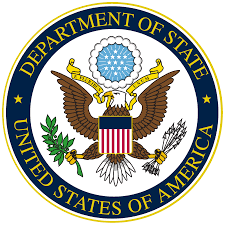USA Announces New Humanitarian Assistance for Displaced Rohingya
ASIA-UPDATES ON MYANMAR ROHINGYA GENOCIDE, 9 Mar 2020
Morgan Ortagus | US State Department - TRANSCEND Media Service
5 Mar 2020 – On March 3, the United States announced more than $59 million in additional humanitarian assistance for Rohingya refugees and host communities in Bangladesh and internally displaced Rohingya and members of other affected communities in Burma. This funding will help address the emergency needs of more than 900,000 refugees in Bangladesh, many of whom are Rohingya women and children from Rakhine State, Burma, as well as the needs of Bangladeshi host communities. This funding will also provide life-saving assistance to internally displaced persons, including Rohingya, and members of other affected communities in Burma, including those affected by the fighting between the Burmese military and the Arakan Army.
The United States remains the leading contributor to the humanitarian response to this crisis in Burma and Bangladesh. With this new funding, our total humanitarian assistance for this crisis is nearly $820 million since the outbreak of violence in August 2017. Of this funding, nearly $693 million is for programs inside Bangladesh. Given the tremendous funding needs for this crisis, we welcome the contributions that some Member States have made to this humanitarian response in recent months, and we urge them to do more and call on other countries and stakeholders to contribute.
Total U.S. humanitarian assistance for the crisis provides support in all sectors of the response: communicating with communities; coordination; education; emergency telecommunications; food security; health; logistics; nutrition; protection (including addressing gender-based violence and child protection); shelter and non-food items; site management and site development; and water, sanitation, and hygiene. The United States is contributing to a pilot program by UN agencies and their partners that will provide education to 10,000 Rohingya children using the Burmese curriculum. This funding also includes programs to improve disaster preparedness and bolster access to education for Rohingya in Bangladesh. This will be key to preparing Rohingya for voluntary, safe, dignified, and sustainable repatriation when conditions in Burma are conducive to such returns.
The United States commends the Government of Bangladesh’s generosity in responding to this humanitarian crisis and appreciates its continued efforts to ensure assistance reaches the affected populations. The U.S. Government is fully committed to ensuring that humanitarian and development assistance also supports the Cox’s Bazar communities who are generously hosting Rohingya refugees. We are pleased that the 2020 JRP includes a more explicit policy focus on their challenges, including a specific strategic objective to foster the well-being of communities in Ukhiya and Teknaf Upazilas. Under this objective, humanitarian partners will support the development of sustainable management frameworks for water, sanitation, and hygiene infrastructure; invest substantially in primary and secondary health care facilities; continue to invest substantially in primary and secondary health care facilities; support sustainable livelihoods for Bangladeshi people; rehabilitate school infrastructure, provide education supplies, and support the professional development of para-teachers; and continue to prioritize environment and eco-system rehabilitation.
We continue to call on Burma to create the conditions that would allow for voluntary, safe, dignified, and sustainable returns, based on the informed consent of those who have been forcibly displaced. We also call on the Government of Burma to ensure unhindered and sustained humanitarian access to all people requiring assistance.
Tags: Asia, Aung San Suu Kyi, Bangladesh, Buddhism, Burma/Myanmar, Cultural violence, Direct violence, Ethnic Cleansing, Free Rohingya Coalition, Genocide, History, Human Rights, International Court of Justice ICJ, Justice, Maung Zarni, Racism, Religion, Rohingya, Social justice, Structural violence, United Nations
DISCLAIMER: The statements, views and opinions expressed in pieces republished here are solely those of the authors and do not necessarily represent those of TMS. In accordance with title 17 U.S.C. section 107, this material is distributed without profit to those who have expressed a prior interest in receiving the included information for research and educational purposes. TMS has no affiliation whatsoever with the originator of this article nor is TMS endorsed or sponsored by the originator. “GO TO ORIGINAL” links are provided as a convenience to our readers and allow for verification of authenticity. However, as originating pages are often updated by their originating host sites, the versions posted may not match the versions our readers view when clicking the “GO TO ORIGINAL” links. This site contains copyrighted material the use of which has not always been specifically authorized by the copyright owner. We are making such material available in our efforts to advance understanding of environmental, political, human rights, economic, democracy, scientific, and social justice issues, etc. We believe this constitutes a ‘fair use’ of any such copyrighted material as provided for in section 107 of the US Copyright Law. In accordance with Title 17 U.S.C. Section 107, the material on this site is distributed without profit to those who have expressed a prior interest in receiving the included information for research and educational purposes. For more information go to: http://www.law.cornell.edu/uscode/17/107.shtml. If you wish to use copyrighted material from this site for purposes of your own that go beyond ‘fair use’, you must obtain permission from the copyright owner.
Read more
Click here to go to the current weekly digest or pick another article:
ASIA-UPDATES ON MYANMAR ROHINGYA GENOCIDE:
